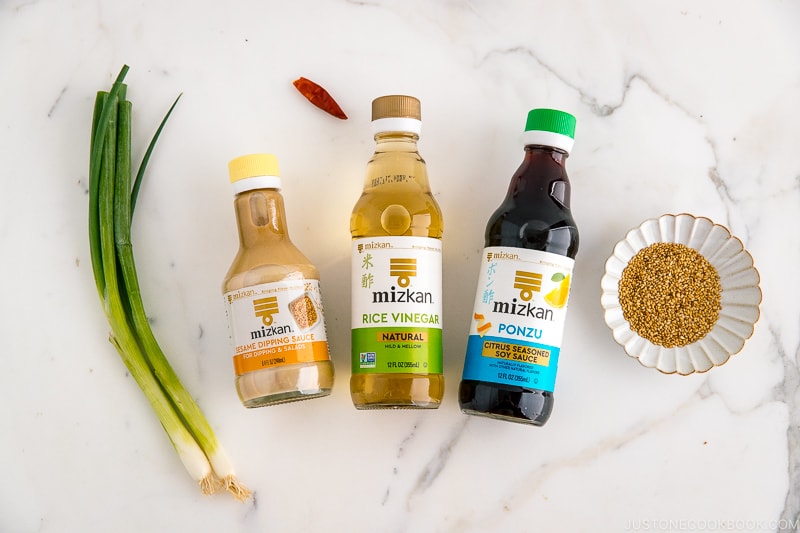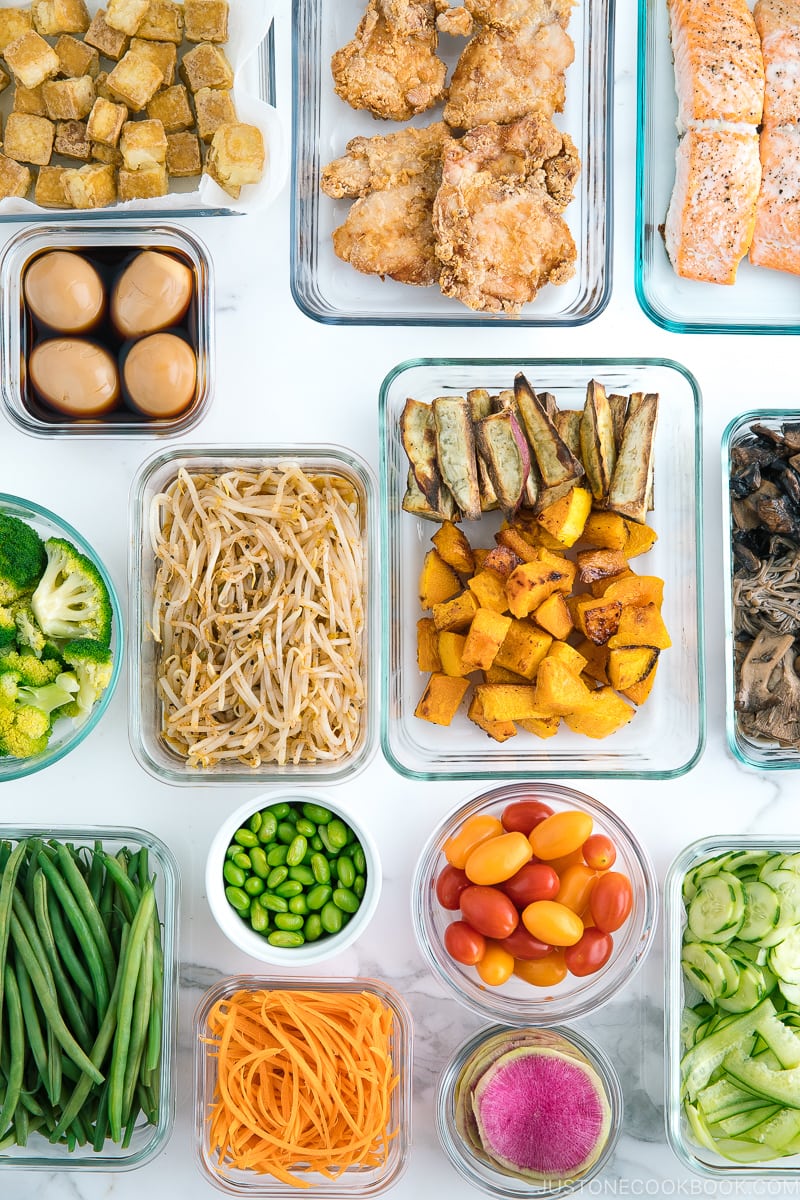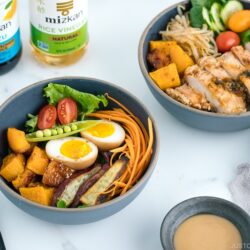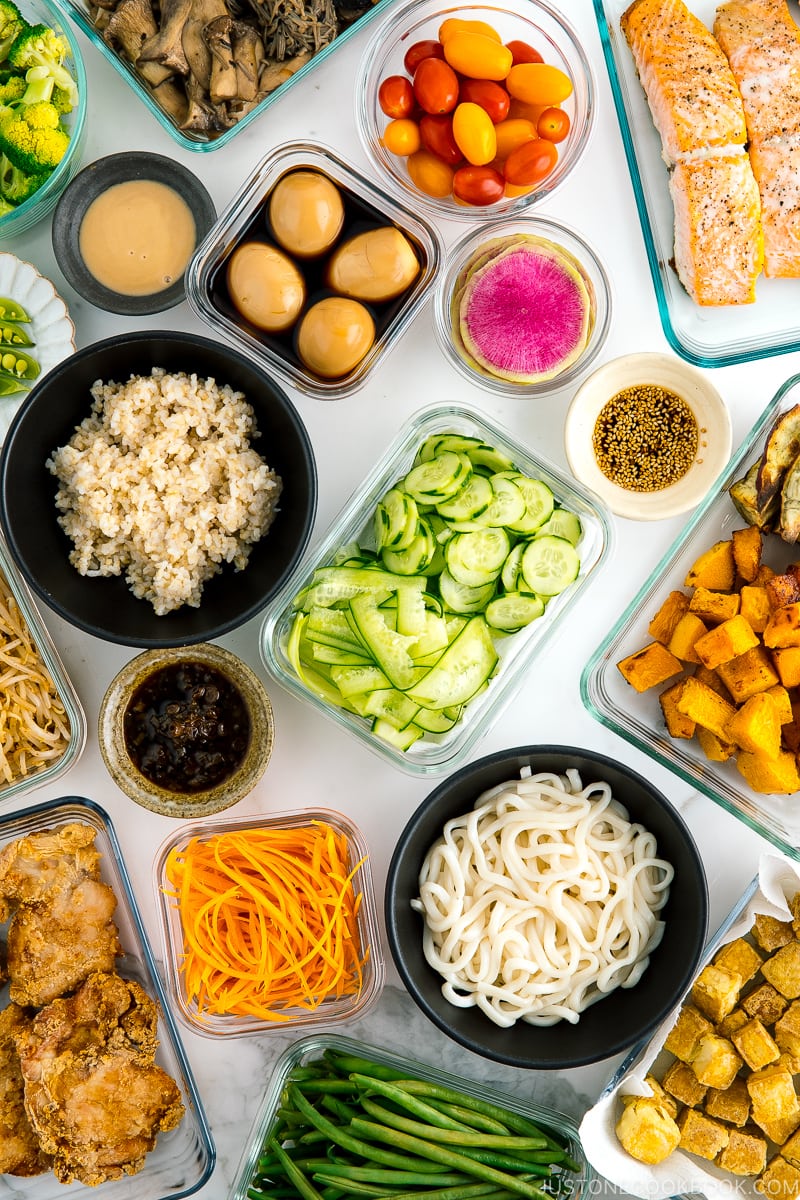
Many of us have been facing a new level of unpredictability this year. For those of us who have kids, it’s hard to keep up with the hustle and bustle of at-home school while preparing a home-cooked dinner that everyone will enjoy. So, I’ve set out to instill some control with Japanese-style meal prep. This meal-prepping strategy has saved my life and been incredibly helpful, so I can’t wait to share my tips and tricks with you!
Why Japanese-Style Meal Prep?
Meal prepping is the process of making food in advance and packing it into containers. When you meal prep, you set yourself up for an easier week ahead.
The Japanese-Style Meal Prep, or Tsukurioki (作り置き) or Jobisai (常備菜) as we call it, is slightly different from the typical meal prep; you still prep/cook ahead of time, but you keep each ingredient and dish in separate containers.
For dinner later that week, you can pick and choose from the made-ahead dishes and put them together into a meal! That’s where my DIY Bowls come in. All you need to do is assemble your own DIY bowls with the ingredients you have already prepared. The best part about it? Your kids can pitch in by adding toppings to their own meals. It’s a customizable experience the whole family will love.
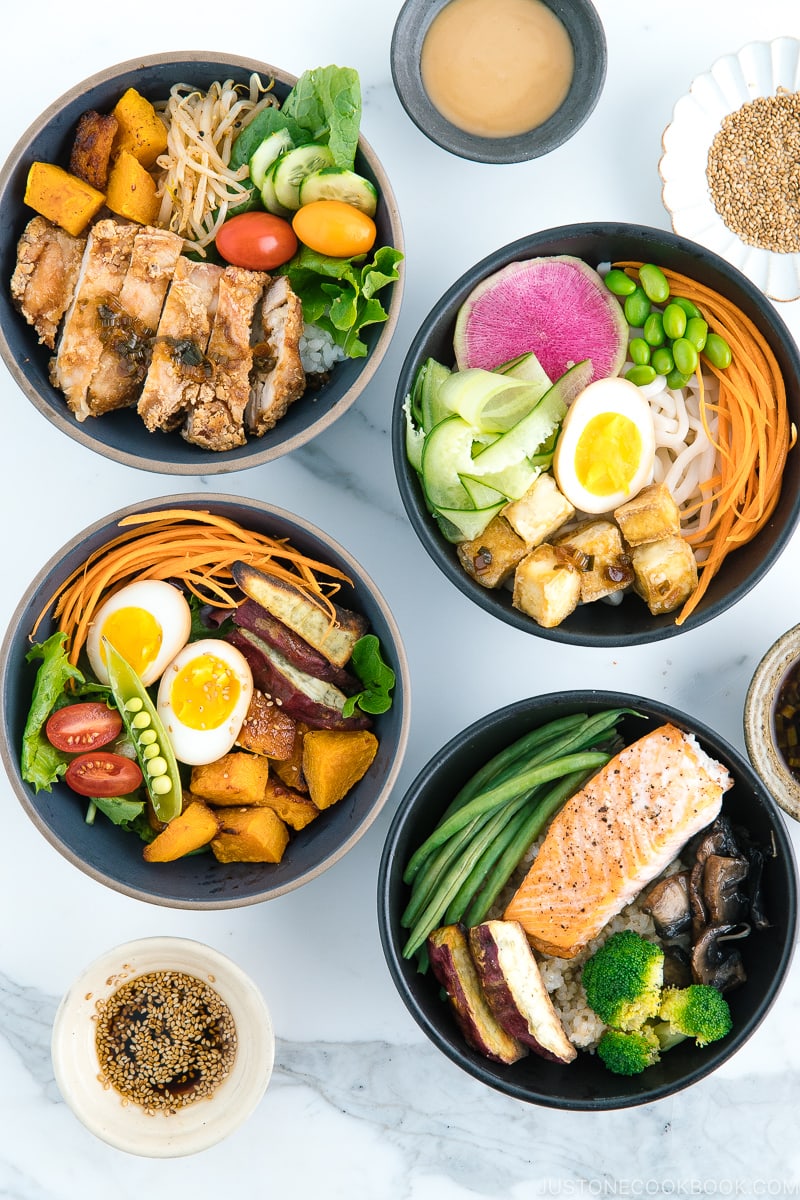
Why You’ll Love Meal Prep DIY Bowls
- Construct your bowl based on what you feel like eating that day.
- Great for students/working professionals who don’t want to cook after a long day at school/work, even if virtual.
- Ideal for family members with different dietary needs.
- Making a different bowl every day is refreshing and fun. Nobody needs to eat the same food every day.
- Keep the seasonings on the food simple and minimal, so you can enjoy different sauces to go with the food.
- No more “What should I cook for dinner?”
Up Your DIY Bowl Game with These Sauces
Because we keep the components of the bowl as simple as possible, you’ll want to have several sauces to elevate your meal.
Today I’ll share three of my favorite sauces: Sweet and Tangy Scallion Soy Sauce, Ponzu Sesame Sauce, and Mizkan Sesame Dipping Sauce.
Whenever I make vinegar-based sauces for Japanese dishes, I exclusively use Mizkan Natural Rice Vinegar and Mizkan Ponzu Citrus Seasoned Soy Sauce. Using Mizkan Vinegars and Sauces while cooking at home is a simple way to integrate Japanese tradition, culture, and flavor into any family mealtime. Genuinely crafted with real organic ingredients, the rice vinegar has a mild tang, refreshing aroma, and the right amount of acidity, and it does not overpower the dish. It is the perfect accent to any meal and makes it easy to create authentic recipes at home.
If you wish to replicate the uniquely delicious flavor of Japanese cooking, I cannot emphasize the importance of getting quality rice vinegar. It is one of the 6 must-have Japanese condiments after all! Whether you’re looking to bring the flavor of Japan to your table with a modern recipe, like this Meal Prep DIY Bowl, or try your hand at a more traditional meal, I always recommend Mizkan.
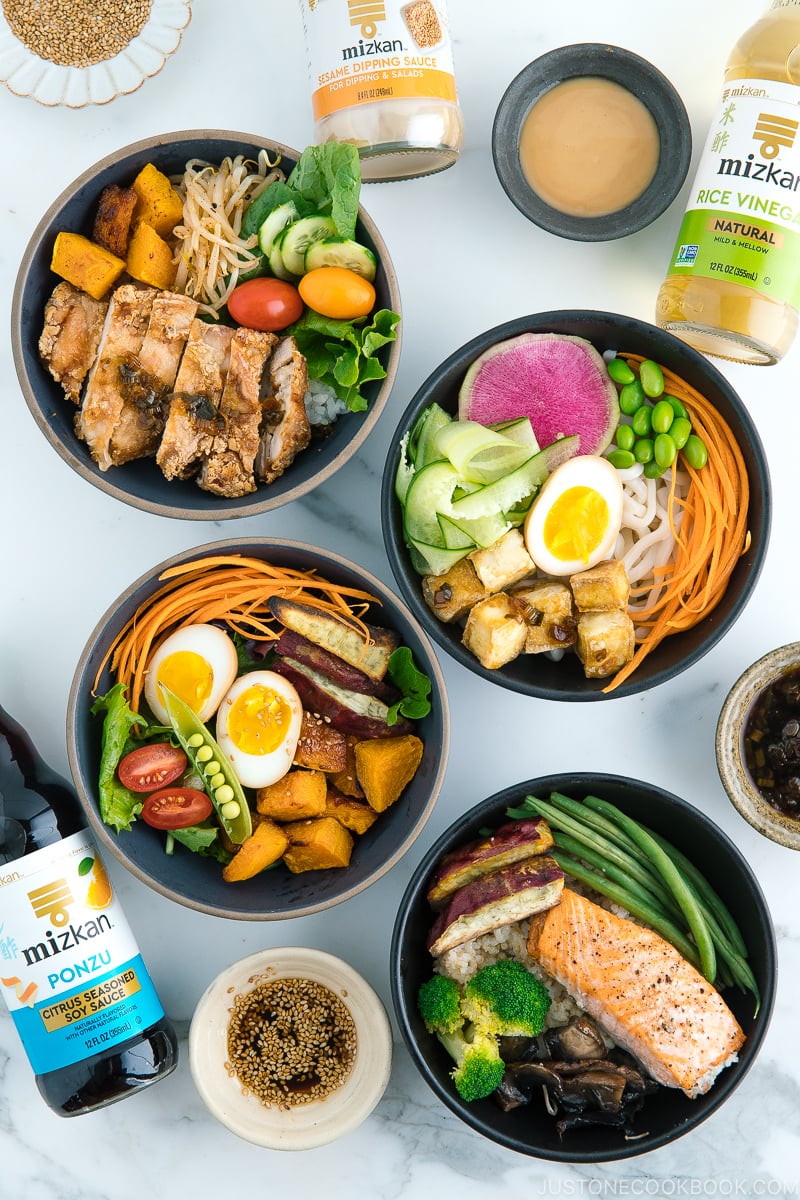
How to Meal Prep DIY Bowls
Step 1: Choose Your Customizable Foods
① PICK CARBS (Base)
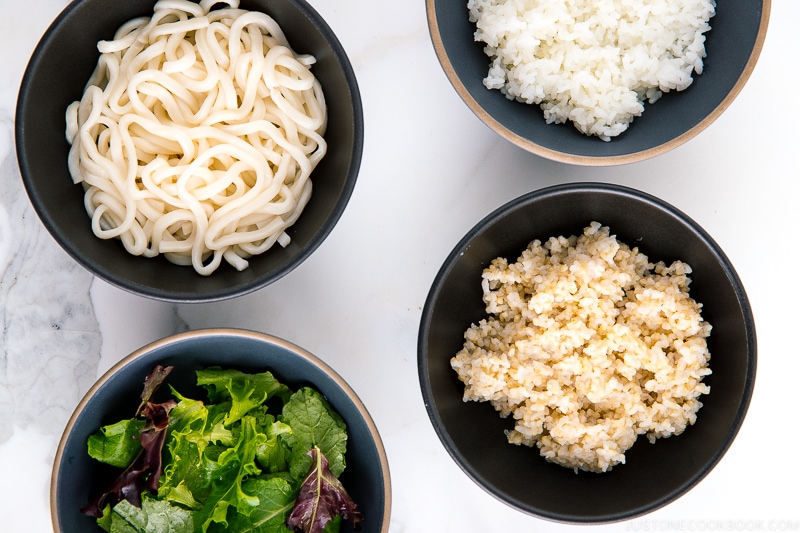
What I made:
- Brown Rice
- Leafy Greens [no-carb]
- Udon noodles
- White Rice
Alternative Options:
- Cauliflower rice [low carb]
- Lentils
- Pasta
- Potatoes
- Quinoa
- Soba Noodles
- Sweet potatoes
- Wild rice
Tip: Carbs go at the bottom of the bowl. If you’re not sure, start with rice or something you’re comfortable making with your eyes closed.
② PICK PROTEINS (Topping 1)
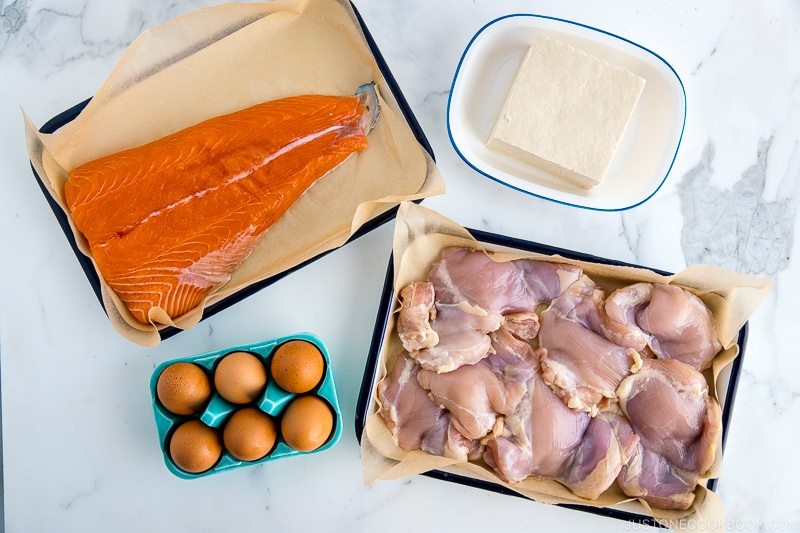
What I Made:
- Chicken
- Egg – hard/soft-boiled, onsen tamago, ramen egg
- Salmon
- Tofu
Alternative Options:
- Beef
- Pork
- Shrimp
- Tempeh
Tip: The protein is easily swappable.
③ PICK VEGETABLES & MUSHROOMS (Topping 2)
Red/Orange/Yellow
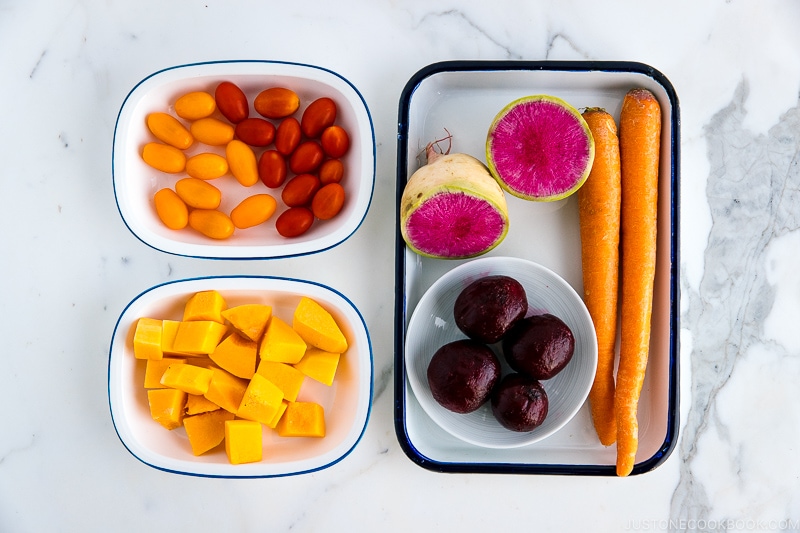
What I Made:
- Butternut squash [cooked] – cubes, roasted
- Carrot [raw/cooked] – julienned or rounds, blanched/sauteed/roasted
- Japanese Sweet Potatoes – boiled/roasted
- Tomatoes/Cherry tomatoes [raw] – wedges
- (Watermelon) radish [raw] – thinly-sliced
Alternative Options:
- Beets [cooked] – sliced, boiled/roasted
- Bell pepper [raw/cooked] – thin strips, roasted/stir-fried
- Corn [cooked] – boiled/roasted
- Kabocha squash [cooked] – thin slices, pan-fried/roasted
Green
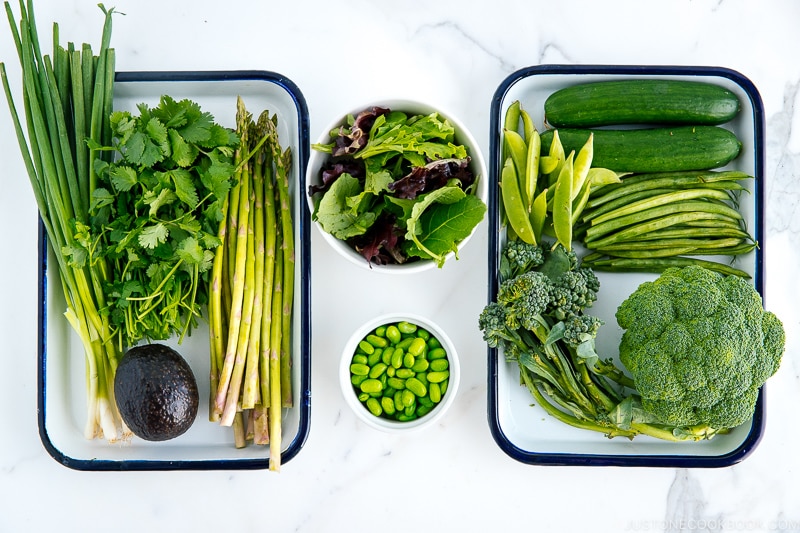
What I Made:
- Broccoli florettes [raw/cooked] – blanched/roasted/stir-fried
- Cucumber [raw] – thinly sliced
- Edamame [cooked] – shucked
- Green beans [cooked] – blanched, roasted/sauteed
- Leafy greens [raw] – shredded/hand-torn
- Snap/snow peas [raw/cooked] – blanched/sauteed/stir-fried
Alternative Options:
- Asparagus [cooked] – sliced, roasted/sauteed/stir-fried
- Avocado [raw] – cubed/sliced
- (Baby) spinach [raw/cooked] – cut, blanched/sauteed/stir-fried
- Bell pepper [raw/cooked] – thin strips, roasted/stir-fried
- Bok choy [raw/cooked] – halved/quartered, blanched/stir-fried
- Broccolini [cooked] – stir-fried/roasted
- Brussel sprout [cooked] – stir-fried/roasted
- Cabbage (red, regular, napa) [raw/cooked] – shredded, stir-fried
- Chard [cooked] – stir-fried/roasted
- Cilantro – destemmed
- Green onion – sliced
- Kale [raw/cooked] – chopped, roasted/sauteed
- Microgreens [raw] – hand-torn
- Zucchini [cooked] – thin strips, roasted/pan-fried
Brown/Black/White
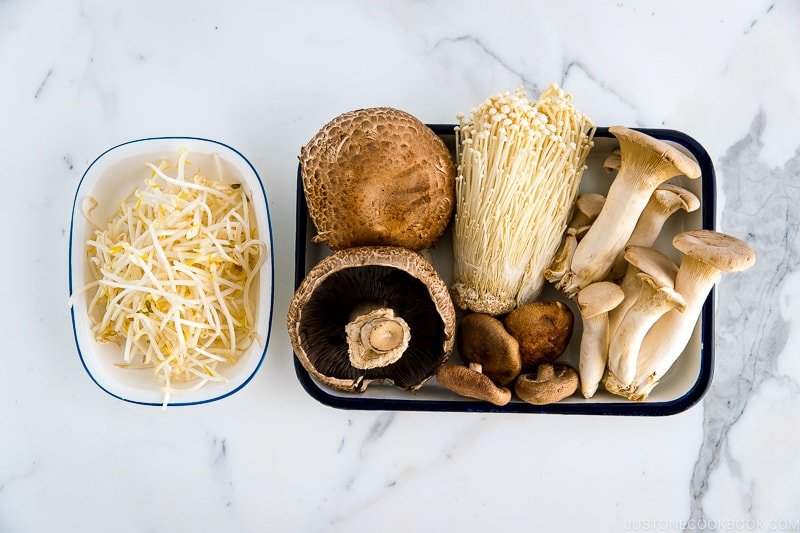
What I Made:
- Bean sprout [cooked] – blanched/sauteed
Alternative Options:
- Mushrooms (button, cremini, enoki, king oyster, portobello, shiitake, shimeji) [raw/cooked] – sliced, roasted/sauteed
Tip: This is where you get to play with colors. The key is to balance the colors and textures so you won’t end up with mostly one color/texture.
④ PICK SAUCE (Topping 3)
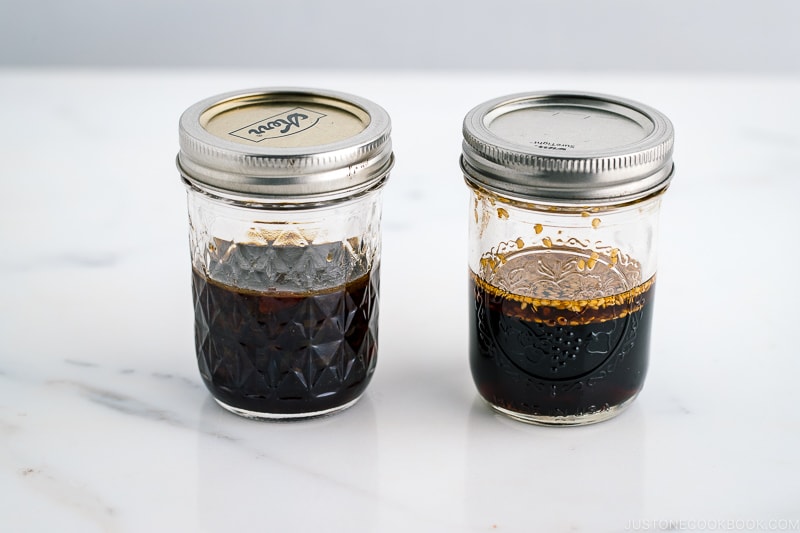
What I Made/Used:
- Mizkan Sesame Dipping Sauce – great for vegetables
- Ponzu Sesame Sauce (recipe below) – great for vegetables
- Sweet and Tangy Scallion Soy Sauce (recipe below) – great for proteins
Alternative Options:
- All-purpose Miso Sauce – great for proteins
- Leek and Miso Sauce (Negi Miso) – great for proteins
- Sambal oelek, sriracha sauce, or any chili sauce – for spicing up
- Tartar Sauce – great for seafood or veggies
Tip: Don’t dress up your bowls with sauce yet! Make sure to store the sauce separately until you’re ready to eat!
⑤ PICK GARNISH (Topping 4)
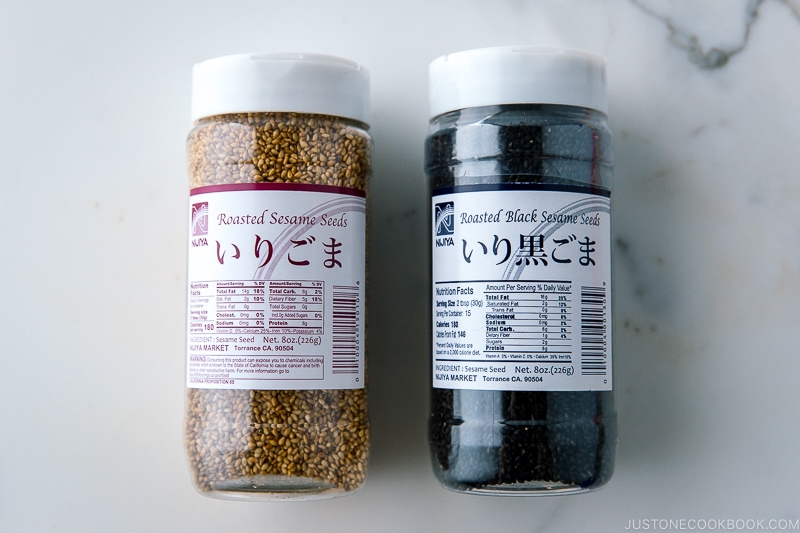
What I Used:
- Roasted sesame seeds
Alternative Options:
- Furikake rice seasonings
- Green onions (chopped)
- Kimchi
- Nori seaweed
- Pickles (Tsukemono)
Tip: Keep it simple!
Step 2: Start Meal Prepping!
① Prep (Wash, Cut, and Marinate)
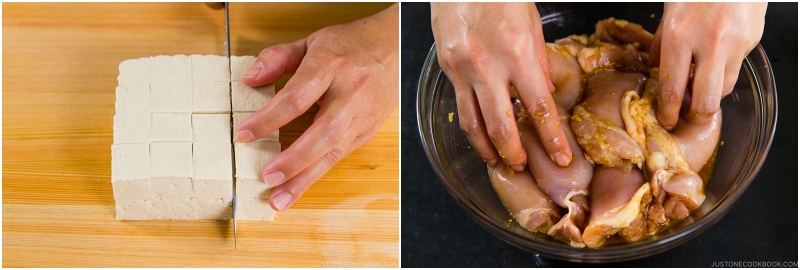
- Preheat the oven (for the next step).
- Marinate the proteins.
- Wash and cut all the vegetables.
② Bake #1 (shorter cooking time) + Blanch
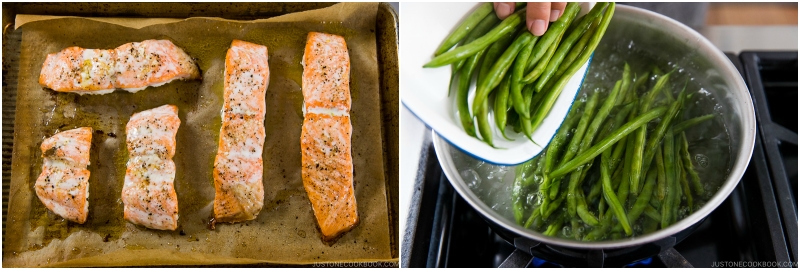
- Start baking food that takes a shorter cooking time (10-15 minutes)
- Meanwhile, blanch any vegetables that require cooking.
③ Bake #2 (longer cooking time) + Pan Fry
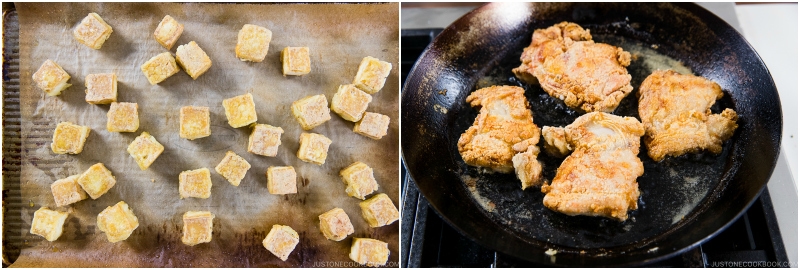
- Start baking food that takes a longer cooking time (30-45 minutes).
- Meanwhile, pan-fry vegetables and proteins that require cooking.
④ Bake #3 (if any) + Make Sauce
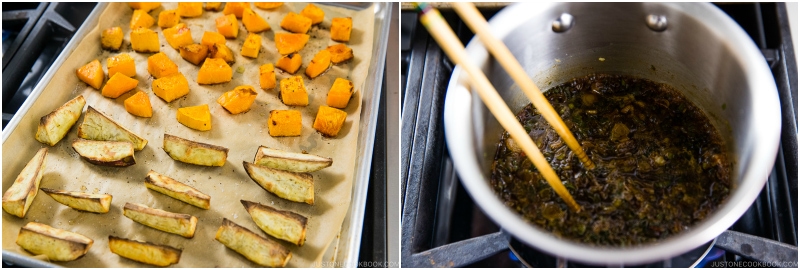
- If you have more food to bake, do so.
- Meanwhile, make/prepare the sauce.
⑤ Pack each dish into containers
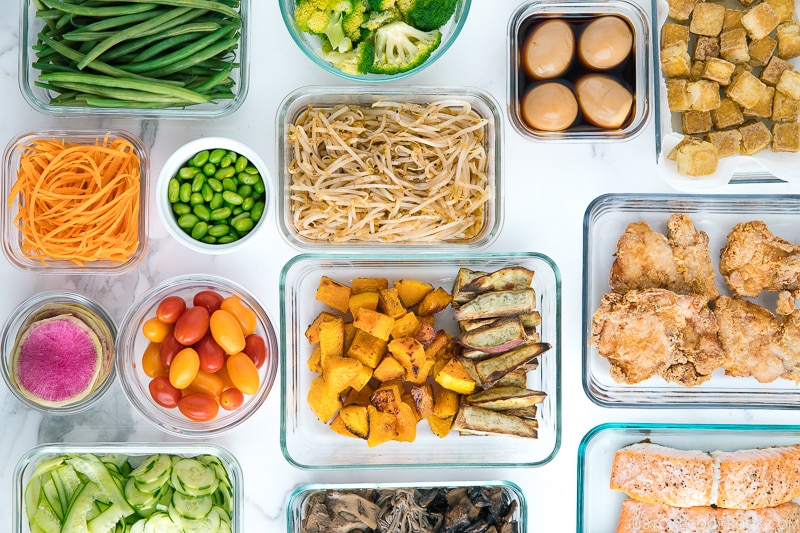
- Start packing the food once it’s cool.
- Label and refrigerate.
Step 3: Create Your Own Bowls
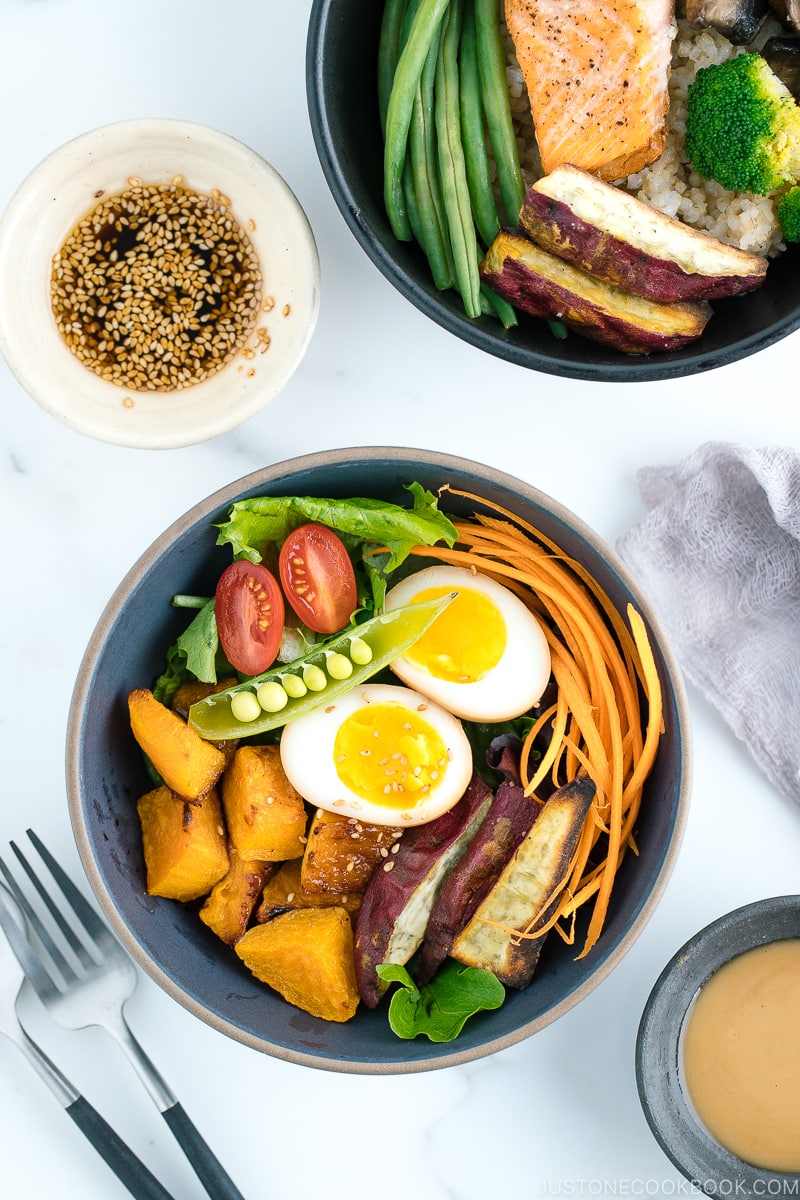
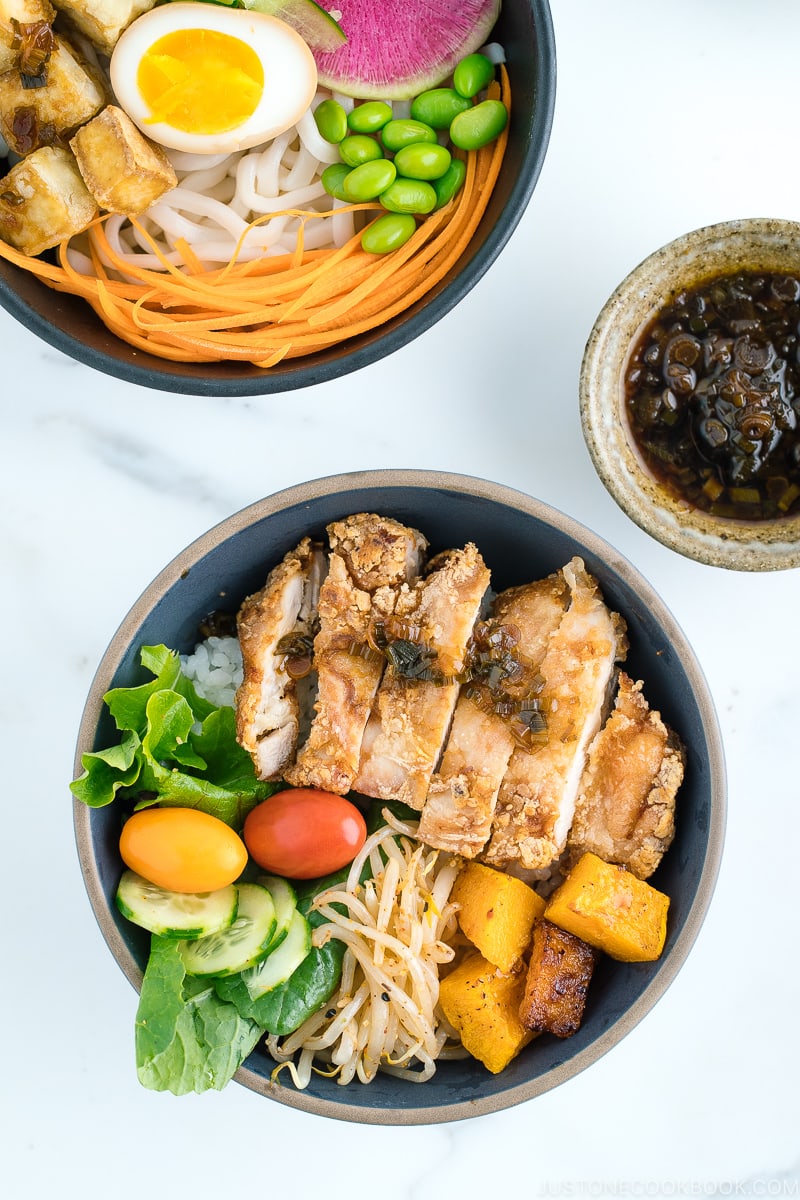
My Bowl
- ① Leafy greens [no carb]
- ② Ramen egg
- ③ Julienned carrot, roasted butternut squash, roasted Japanese sweet potato, tomatoes, snap pea
- ④ Roasted sesame seeds
- ⑤ Mizkan Sesame Dipping Sauce
Kid-Friendly Bowl
- ① White rice
- ② Pan-fried chicken
- ③ Leafy greens, sliced cucumber, tomatoes, Spicy Bean Sprout Salad, roasted butternut squash
- ④ No garnish
- ⑤ Sweet and Tangy Scallion Soy Sauce
As you can see, these DIY Bowls are filled with wholesome, nutrient-rich foods, and I no longer have to stress over what to make my family for dinner.
I hope you have found these tips helpful and enjoy incorporating Japanese meal prepping into your own meal-prep strategy. Any questions or feedback? Leave me your note in the comment box below!
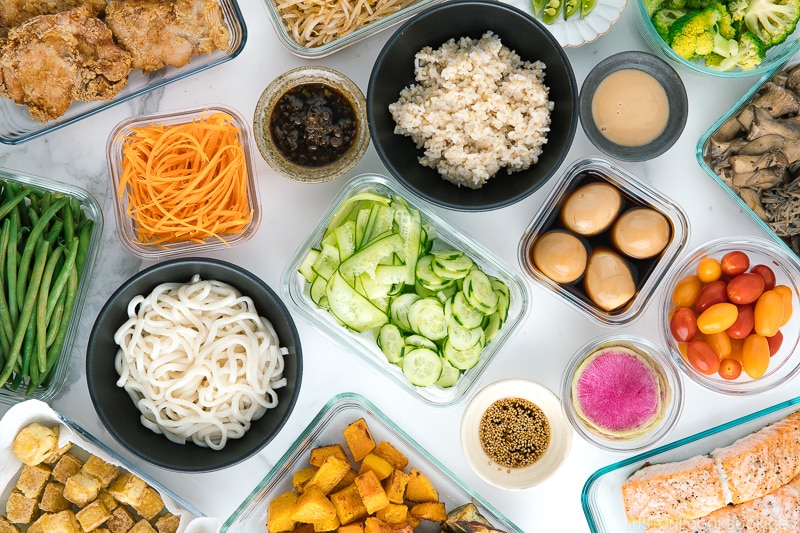
Wish to learn more about Japanese cooking? Sign up for our free newsletter to receive cooking tips & recipe updates! And stay in touch with me on Facebook, Pinterest, YouTube, and Instagram.
Meal Prep DIY Bowls
Ingredients
For the Sweet & Tangy Scallion Soy Sauce
- 6 green onions/scallions (130 g or 4.6 oz; or 1 Tokyo negi)
- 1 dried red chili pepper
- 1 Tbsp toasted sesame oil
- 2 Tbsp sugar
- 2 Tbsp sake
- 3 Tbsp rice vinegar (unseasoned)
- ¾ cup soy sauce
For the Ponzu Sesame Sauce
- 6 Tbsp ponzu
- 2 Tbsp toasted sesame oil
- 2 Tbsp soy sauce
- 1 Tbsp toasted white sesame seeds
For the Baked Salmon
- 1½ lb salmon
- 1 Tbsp sake
- 1 Tbsp extra virgin olive oil
- Diamond Crystal kosher salt
- freshly ground black pepper
For the Baked Tofu
- 16 oz extra-firm tofu
- 2 Tbsp potato starch or cornstarch (for coating)
- 2 Tbsp extra virgin olive oil
For the Pan-Fried Chicken
- 2 lb boneless, skinless chicken thighs
- 1 Tbsp sake
- 1 Tbsp soy sauce
- 2 cloves garlic (pressed/minced)
- 1 knob ginger (grated, with juice)
- 4 Tbsp potato starch or cornstarch (for coating)
- 4 Tbsp neutral oil (for pan-frying)
For the DIY Bowls
- carb of your choice (please see the blog post for details)
- veggies/mushrooms of your choice (please see the blog post)
- sauce of your choice (please see the blog post)
- garnish of your choice (please see the blog post)
Instructions
① TO PREP (WASH, CUT, and MARINATE)
- Veggies/Mushrooms: Rinse and cut the vegetables of your choice to the appropriate size. Clean and cut the mushrooms. I use a julienne peeler to save time julienning carrots and peeling cucumbers.
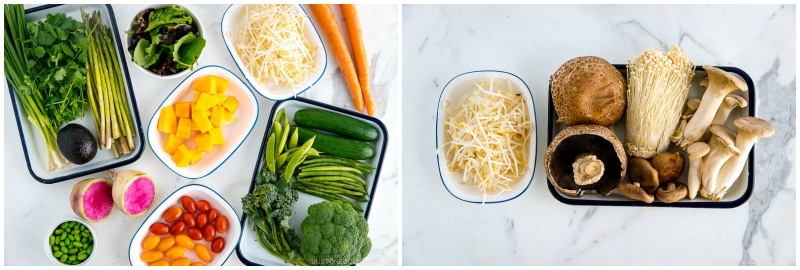
- Salmon: Prepare 1½ lb salmon by cutting it into individual pieces. Drizzle with 1 Tbsp sake to remove any unwanted odor.
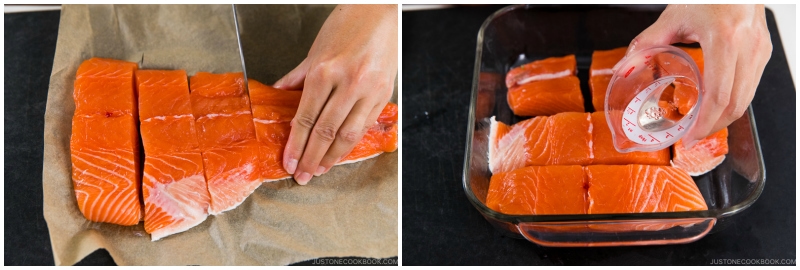
- Tofu: Wrap 16 oz extra-firm tofu with a paper towel and press the tofu with a heavy object on top to drain the extra liquid.
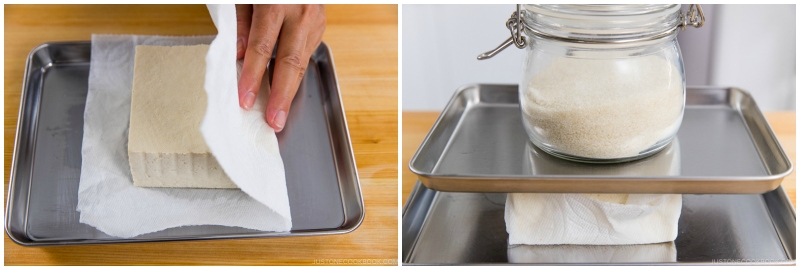
- Chicken: In a large bowl, add the chicken marinade ingredients: 1 Tbsp sake, 1 Tbsp soy sauce, 2 cloves garlic, and 1 knob ginger (grated, with juice). Add 2 lb boneless, skinless chicken thighs to the bowl and marinate until you‘re ready to cook (at least 30 minutes).
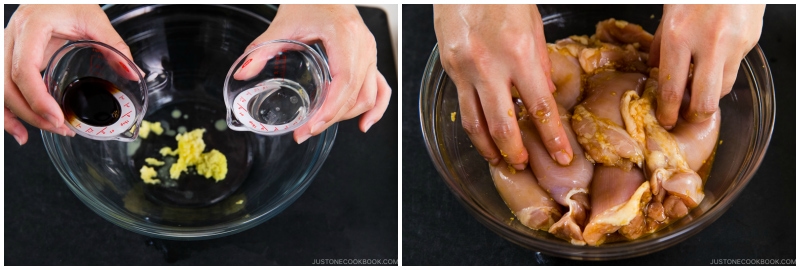
② TO BAKE #1 (A SHORTER COOKING TIME) + BLANCH
- Salmon: Prepare a baking sheet lined with parchment paper. Drizzle 1 Tbsp extra virgin olive oil over the salmon and season it with Diamond Crystal kosher salt and freshly ground black pepper. Bake at 425ºF (218ºC) for 12–15 minutes.
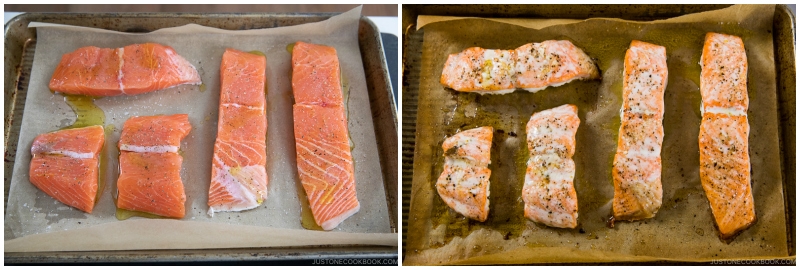
- Veggies: Boil water in a large pot and cook the vegetables individually until tender, about 2–4 minutes depending on the vegetable.
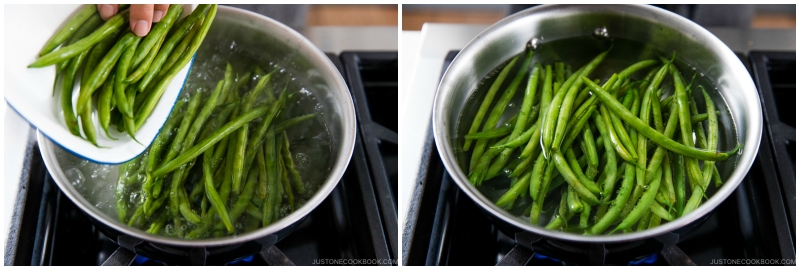
③ TO BAKE #2 (A LONGER COOKING TIME) + PAN-FRY
- Tofu: Remove the paper towel and cut the tofu into small cubes.
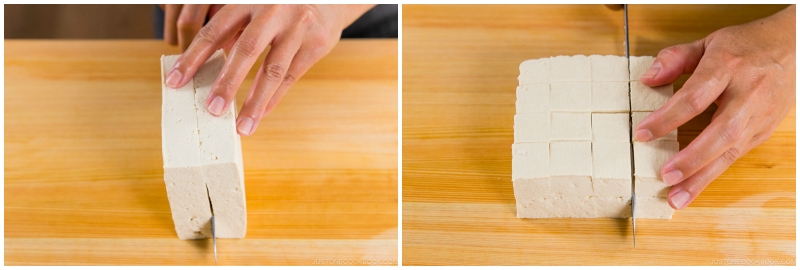
- Prepare 2 Tbsp potato starch or cornstarch and 2 Tbsp extra virgin olive oil in separate bowls. Dredge the tofu cubes, shake off the excess starch, and coat with the oil.
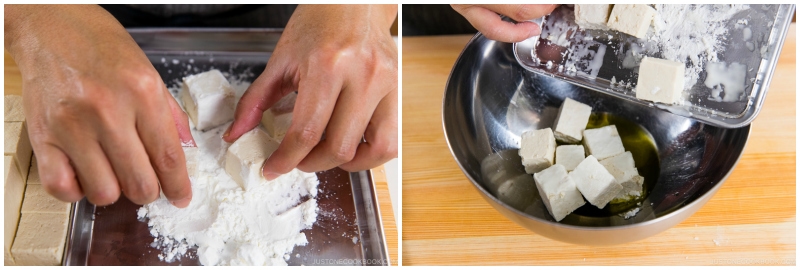
- Prepare a baking sheet lined with parchment paper. Place the tofu on the baking sheet and bake at 425ºF (218ºC) for 25–30 minutes.
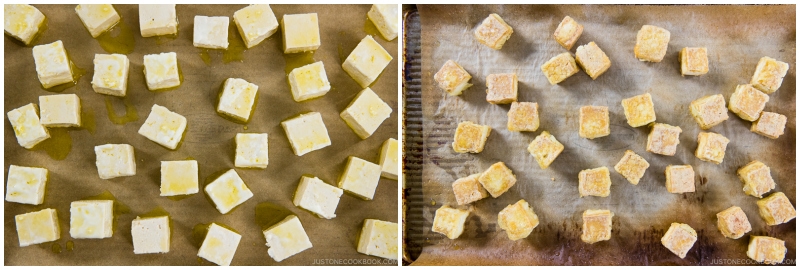
- Chicken: Prepare 4 Tbsp potato starch or cornstarch. Coat the marinated chicken in the potato starch and shake off any excess.
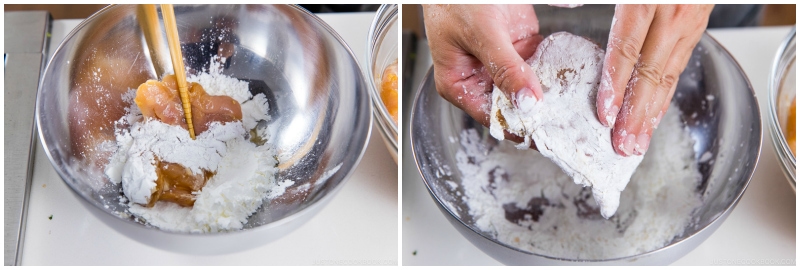
- Heat 4 Tbsp neutral oil in a large pan over medium-high heat (or medium heat on a professional stove). Pan-fry the chicken for 3–4 minutes on each side until crisp and golden on the outside and cooked through on the inside. Don‘t flip until the first side is golden. Drain off any excess oil on a paper towel.
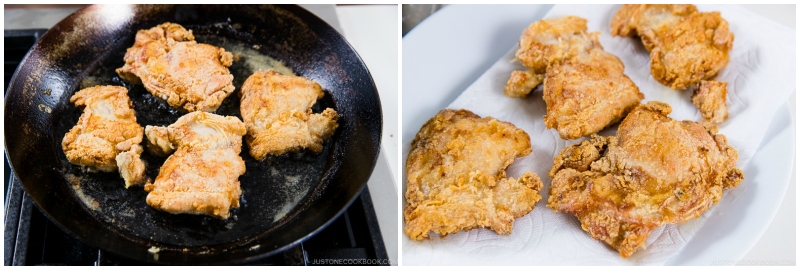
④ TO BAKE #3 (IF ANY) + MAKE SAUCES
- Veggies: Coat the vegetables of your choice with olive oil and season with salt and pepper. Bake at 425ºF (218ºC) for approximately 15–20 minutes; the cooking time varies depending on the vegetable.
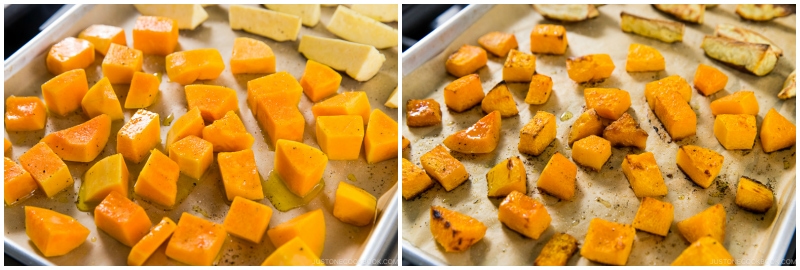
- Ponzu Sesame Sauce: Combine all the ingredients in a mason jar: 6 Tbsp ponzu, 2 Tbsp toasted sesame oil, 2 Tbsp soy sauce, and 1 Tbsp toasted white sesame seeds.
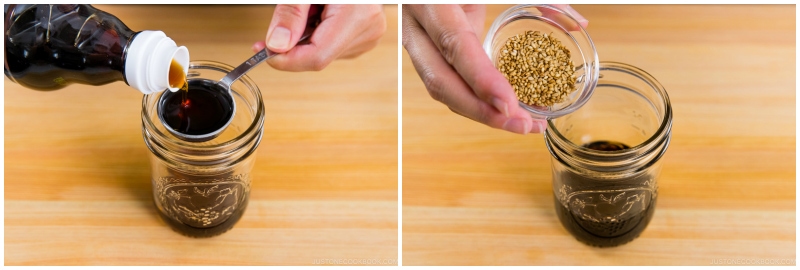
- Sweet & Tangy Scallion Soy Sauce: Slice 6 green onions/scallions. Remove and discard the seeds of 1 dried red chili pepper and cut the chili into small rounds.
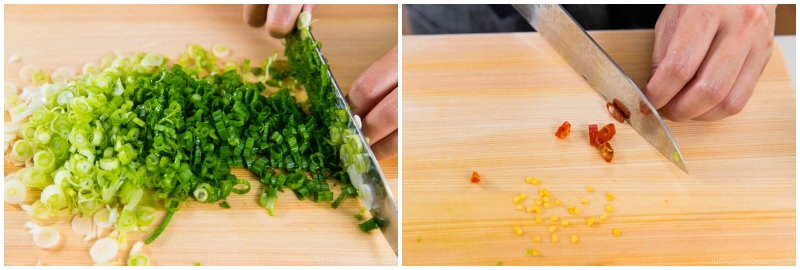
- Heat 1 Tbsp toasted sesame oil and the chili pepper in a small pot. When the oil is hot, add the sliced green onions and sauté.
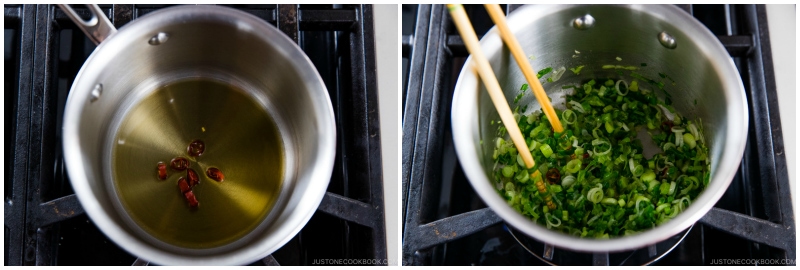
- Add 2 Tbsp sugar, 3 Tbsp rice vinegar (unseasoned), and 2 Tbsp sake.
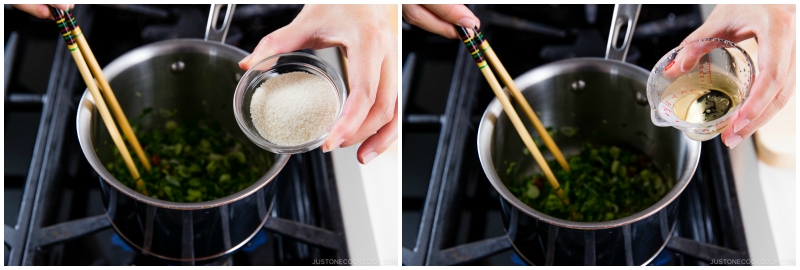
- Add ¾ cup soy sauce and bring it to a simmer to let the alcohol evaporate. Turn off the heat and set aside to cool.
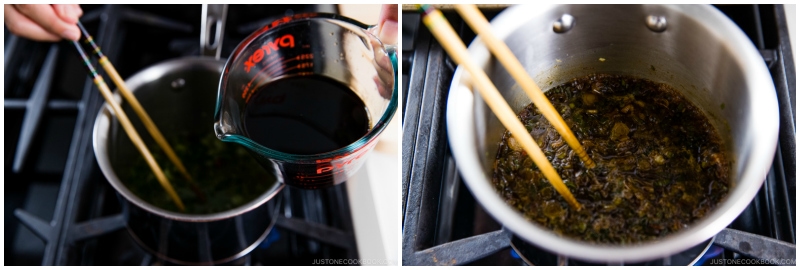
- You can save the sauces in mason jars.

⑤ TO PACK INTO CONTAINERS
- Pack each prepped vegetable and protein in separate containers. Cool completely, then store in the refrigerator.

⑥ TO MAKE DIY BOWLS
- Build the bowls based on the diner‘s preference and drizzle with the sauce of choice.
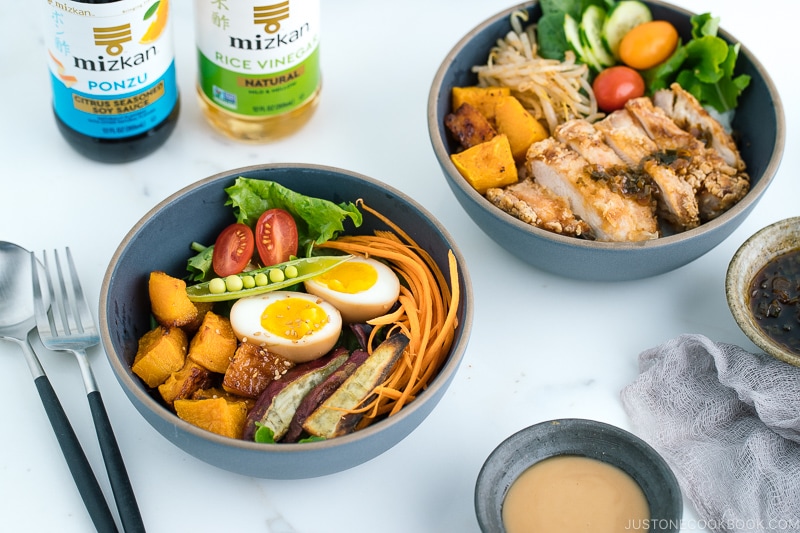
Notes
Nutrition
Did you make this recipe?
Tag @justonecookbook on Instagram so we can see your delicious creation!


